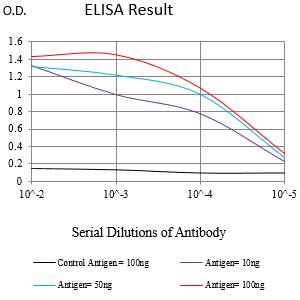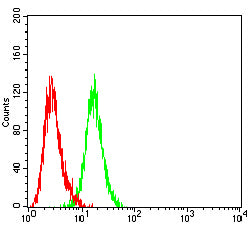


| WB | 1/500 - 1/2000 | Human,Mouse,Rat |
| IF | 咨询技术 | Human,Mouse,Rat |
| IHC | 咨询技术 | Human,Mouse,Rat |
| ICC | 技术咨询 | Human,Mouse,Rat |
| FCM | 1/200 - 1/400 | Human,Mouse,Rat |
| Elisa | 1/10000 | Human,Mouse,Rat |
| Aliases | HLAF; CDA12; HLA-5.4; HLA-CDA12 |
| Entrez GeneID | 3134 |
| clone | 3F11F4 |
| WB Predicted band size | 39kDa |
| Host/Isotype | Mouse IgG2b |
| Antibody Type | Primary antibody |
| Storage | Store at 4°C short term. Aliquot and store at -20°C long term. Avoid freeze/thaw cycles. |
| Species Reactivity | Human, Mouse |
| Immunogen | Purified recombinant fragment of human HLA-F (AA: 22-305) expressed in E. Coli. |
| Formulation | Purified antibody in PBS with 0.05% sodium azide |
+ +
以下是3篇关于HLA-F抗体的相关文献概览,涵盖其功能、病理作用及临床应用研究:
---
1. **文献名称**:*HLA-F: A New Player in Immune Checkpoint Regulation During Viral Infection and Cancer*
**作者**:Goodridge JP 等
**摘要**:该研究探讨HLA-F在病毒(如HIV、HCV)感染及肿瘤微环境中作为免疫检查点的作用,揭示其通过结合NK细胞和T细胞表面受体(如KIR3DS1/LILRB2)调控免疫应答。研究强调HLA-F抗体在阻断免疫抑制信号中的潜在治疗价值。
---
2. **文献名称**:*HLA-F Expression as a Marker of Immune Evasion in Solid Tumors*
**作者**:Lin A 等
**摘要**:分析HLA-F在肺癌、乳腺癌等实体瘤中的高表达现象,发现其与肿瘤细胞逃逸T细胞杀伤相关。实验表明,靶向HLA-F的单克隆抗体可恢复T细胞活性,为癌症免疫治疗提供新靶点。
---
3. **文献名称**:*HLA-F Antibodies in Pregnancy: Association with Recurrent Miscarriage and Pre-eclampsia*
**作者**:Moradi S 等
**摘要**:研究妊娠并发症(如复发性流产、子痫前期)患者体内HLA-F抗体水平异常升高的现象,提出母胎界面HLA-F表达失调可能引发自身免疫反应,提示抗体检测或成为早期诊断标志物。
---
**备注**:HLA-F研究多聚焦于非经典MHC I类分子的免疫调节机制,其抗体开发及临床应用尚处探索阶段,近年研究倾向于其在肿瘤免疫治疗和妊娠病理中的潜在价值。如需具体文献链接或补充,可进一步提供研究方向。
**Background of HLA-F Antibodies**
HLA-F, a non-classical major histocompatibility complex (MHC) class I molecule, differs from classical HLA-A, -B, and -C in its limited polymorphism and restricted tissue expression. Primarily expressed in immune-privileged sites (e.g., placenta) and under stress conditions (e.g., viral infection, cancer), HLA-F interacts with both innate and adaptive immune receptors, including NK cell receptors (e.g., KIR3DS1) and the CD94-NKG2A inhibitory complex. Its role in immune tolerance, viral defense, and pregnancy has sparked interest in therapeutic targeting.
HLA-F-specific antibodies are critical tools for studying its expression, structure, and function. Monoclonal antibodies (mAbs) against HLA-F enable detection in assays like flow cytometry, Western blot, and immunohistochemistry. These antibodies help elucidate HLA-F’s interaction mechanisms, such as its ability to present peptides or bind receptors in an open conformer form. Challenges include ensuring specificity due to structural similarities among MHC-I molecules.
Clinically, HLA-F is overexpressed in certain cancers (e.g., melanoma, breast cancer), correlating with immune evasion and poor prognosis. Antibodies targeting HLA-F are being explored for diagnostic and therapeutic applications, including blocking immune inhibitory pathways or enhancing antigen presentation. Recent studies suggest HLA-F may complement classical immune checkpoint inhibitors (e.g., anti-PD-1), offering novel combinatorial strategies. Ongoing research aims to clarify its dual roles in immune activation/suppression and optimize antibody-based interventions.
×